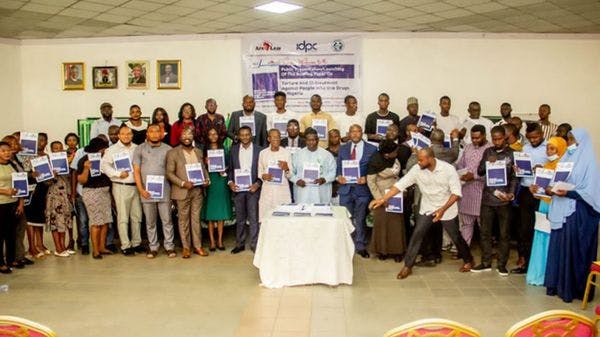Toward accountability and redress: Launch of the report on torture and ill-treatment of people who use drugs in Nigeria
By Maria-Goretti Loglo (International Drug Policy Consortium - IDPC) and Chinweke Okereke (African Law Foundation - AFRILAW)
In April 2022, IDPC in collaboration with African Law Foundation (AFRILAW) and the National Human Rights Commission of Nigeria (NHRC), with funding support from Robert Carr Foundation, launched its report and advocacy briefing on torture and ill-treatment of people who use drugs in Nigeria.
This event – and the report that it presented – can be regarded as an example of how the drug reform movement can mobilise around UN human rights procedures to change national conversations around drugs, placing an emphasis on human rights and community empowerment.
The launch brought together over 60 stakeholders from civil society, community members of people who use drugs, and several Nigerian public bodies and authorities, including the Nigeria Law Reform Commission (NLRC), the Legal Counsel of Nigeria (LACON), the National Anti-Torture Committee (NATC), National Human Rights Commission (NHRC), the Federal Ministry of Health, and the Nigeria Drug Law Enforcement Agency. Private legal practitioners and the media also attended the meeting.
The report presented at this meeting, which was developed jointly by IDPC and AFRILAW, provides evidence of the physical and mental violence faced by people who use drugs in Nigeria. In his welcome address, Chinwike Okereke, Executive Director of AFRILAW, noted that the information in the report was collected through a mixed-methods approach that incorporates desk research, interviews and a survey of people who use drugs and other stakeholders in the Nigerian states of Abia, Akwa-Ibom, Enugu, Kaduna and the Federal Capital Territory (FCT), which was conducted in September 2021.
Chinwike emphasised that ‘The evidence that was gathered showed people who use drugs were routinely subjected to physical, mental and sexual violence at the hands of law enforcement agents, and in close treatment centres which often amounted to torture or ill-treatment’.
In attendance was the The Executive Secretary of the National Human Rights Commission (NHRC), Tony Ojukwu who expressed worry on the rising drug use statistics in the country. He blamed poverty for this uptick in drug use.
According to him, ‘Economic conditions such as unemployment increased the vulnerability of people who use dugs, which in turn deprived individuals of their income, dignity and voice to demand and defend their rights. Social conditions such as lack of access to adequate healthcare, education and homelessness are key drivers.’ He therefore called for close and stronger collaboration of the National Human Rights Commission and civil society in the monitoring and ensuring there is absolute zero tolerance of torture of marginalised and vulnerable persons, especially the poor, who often are subject to these acts.
Maria-Goretti Loglo, the African Consultant for IDPC, leveraged the occasion to call for an end to the war on drugs, which has resulted in the perpetuation and increase of torture for drug-related offences, as well as disproportionate actions by some state agencies. She indicated that the war on drugs has failed to address the drug situation while violating human rights; she further called for state actors to recognise that when we criminalise activities such as drug possession for personal use, the enforcement of these criminalising laws disproportionately impacts people who are struggling the most, especially those who live in poverty.
In a statement delivered on his behalf, the Executive Director of the Drug Harm Reduction Advocacy Network (DHRAN), Mr. Aniedi, lamented the ill-treatment and dehumanising experiences that communities of people who use drugs undergo each day in the name of the war on drugs by police officers. He called on policymakers, especially the National Drug Law Enforcement Agency and the Commission on Human Rights, to ensure that the rights of people who use drugs are protected. ‘People who use drugs must also enjoy all the rights enshrined in our constitution’, he stated, ‘the mere fact that one uses drugs does not take away those inherent rights’.
Several solidarity messages from the Ministry of Health and the NDLEA also called for collaboration in addressing the issue of drug use from a public health and human rights lens, rather than the criminal justice approach.
The report presented at this briefing was used as the basis for a joint advocacy effort by IDPC, AFRILAW, and Nigerian civil society with the UN Committee Against Torture, a body of UN experts that reviewed for the first time Nigeria’s compliance with the UN Convention Against Torture in Autumn 2021. As a result of this effort, the Committee Against Torture expressed concern at reports of torture and ill-treatment against people who use drugs, particularly at hands of the NDLEA and drug rehabilitation centres, and urged the Nigerian authorities to stop and investigate such instances. IDPC hopes that gatherings like the one held in Nigeria in April this year are a first step towards implementing these recommendations.
Topics
Regions
Related Profiles
- African Law Foundation (AFRILAW)
- International Drug Policy Consortium (IDPC)
